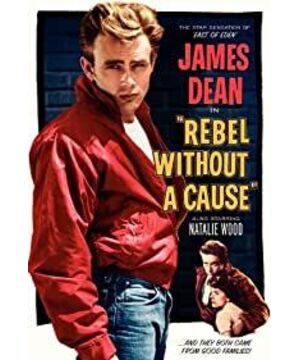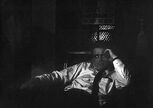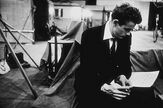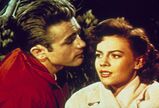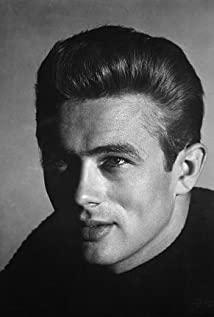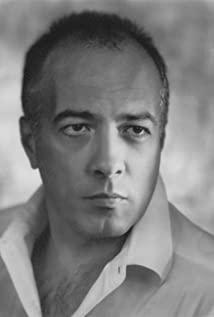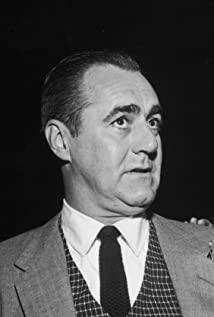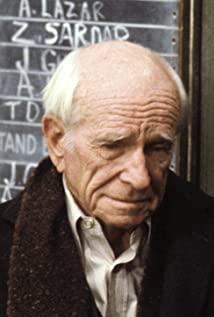The reasons why we are who we are today are complex. Our parents, our hometown, the books we've read, the people we've loved, the breakfast we ate today, and even a stray cat you just ran into when you went out to take out the trash that you want to touch because of parasites and It is possible to be caught and give up, all of this, all that we have been through since the beginning of life makes us who we are today. In the big era, the experience is similar but the personal experience is different in subtleties, which makes us have different feelings and opinions about the same event, the same person, and the same movie. This is the so-called "a thousand people have a thousand Hamlets in their hearts ."
I think that's why I can't see the so-called "wild and tender" charm in James Dean's face, the so-called zeitgeist, as I read "The Catcher in the Rye" and "On the Road" with great anticipation. , but failed to resonate. Out of the general environment of that era, it is difficult for me to experience the confusion and confusion of a whole generation in a country. What I have seen in this film is more of three defective families raising three defective individuals.
The family of the male protagonist jim is a typical family where matriarchy suppresses patriarchy. Whenever parents appear on the screen at the same time, the father is always the weaker party.
Even more interesting is that in the scene at the beginning of the film, in addition to the parents and children, there is a fourth family member: the grandmother.
At this time, the father is powerless whether it is facing the child, the wife, or the mother. Looking at the big from the small, and looking at the past from the present, it is not difficult to find that Jim's father, an individual with three identities of husband, son and father in the family, showed powerlessness when he was a husband and a son. This powerlessness, in Jim's eyes, is also the powerlessness of the image of his father. With the influence of many years of family dramas, we can even imagine countless scenes in which the mother-in-law and the daughter-in-law are fighting a cold war, and Jim's father, whose son is also her husband, is splinted.
Most people's first idol is their father, in large part because of the authority of patriarchy in traditional families. And when the authority of the patriarchy is violated again and again and loses its status, the juveniles who have lost their idols are naturally confused, not to mention the lack of care and communication brought about by long-term family quarrels. Many times, when a child has a problem, parents will mention his or her difficulty in communication, but this difficulty in communication is precisely the result of the parent's neglect of communication when the child is young. When he wants to talk to you, you think he's young and it doesn't matter what he says. When you want to talk to him, he thinks you can say anything, but it doesn't matter.
In the film, when jim tried to use force on the police detective, the police detective also used force to subdue him. After showing his strength, the police detective asked him to use the blowing furniture to vent the pressure in his heart. After jim felt the physical pain, The detective begins to guide jim and communicate with him. And that's exactly what a normal, authoritative father in the traditional sense would do. When this missing patriarchy was temporarily filled, jim also sobered up from the alcohol and temporarily regained his calm.
In the second half of the film, Jim, who had experienced the racing incident, returned home and had a heated argument with his mother. He said that he was tired of his parents' quarrels and his mother's repeated moves because of Jim's incompatibility. During the quarrel with his mother, jim questioned his father or asked for help from his father.
But his father's silence and showing weakness as always angered jim, and his desperation for the father's power made him go from the worship of the father's power to the confusion after the collapse of the father's power, and finally came to the step of "killing the father". He overthrew his father, grabbed his neck, and pushed out the door after a stalemate. After leaving the family of origin, Jim went directly to the police station to find a substitute for the patriarchal detective. After the search failed, he called the heroine, which then led to the story line of the observatory behind.
In addition to confusion, the lack of paternity has another effect on children, which is uneasiness, which is manifested many times in the film as "afraid of cold". For example, at the beginning of the film, Jim covered the toys on the ground with newspaper, tightened his clothes, and put his hands between his legs to keep warm.
This kind of performance also appears on another protagonist, plato, such as plato at the police station at the beginning of the film
It was also at this time that jim found a plato similar to himself, just like the "cold" toy on the street. He tried handing his clothes to Plato to keep him warm, who subconsciously refused due to his prolonged emotional self-isolation. After contacting, we will find that plato's infatuation with jim is one of the attraction of those who suffer from the same disease, and the other is his desire for patriarchy, which has been transferred to jim. The beginning of this desire is that this time jim wants to put a coat on plato.
If we say that jim is a mild patient of the disease of lack of patriarchy, and there is a tendency to become a doctor for a long time. Then plato is a severely advanced patient. The confusion and unease caused by the lack of patriarchy has made him develop a tendency to self-destruct, which has been shown at the beginning of the film.
Different from jim and plato, the heroine judy is not facing the lack of patriarchy in the usual sense, but the lack of patriarchy caused by the deformed obsession with patriarchy and not getting the desired response. That's why the detective can guide jim but not her. She is facing a more complicated problem than that of jim and plato, but this side of her is covered so little in the film that at the end of the credits, after jim frees himself and plato destroys himself, what judy faces The question remains unresolved.
After Plato's address book was stolen, he first ran to another source of security for him: the gun. At this time, he found a letter from his parents - a remittance slip without any exchange of greetings, and since then Plato's last hope for his original parents has been dashed. All love and hope goes to jim. He followed jim and judy to the abandoned building, the three of them played and played, and plato fell asleep in a sense of happiness and security.
When I watched the film for the first time, I always felt that the connection between judy and plato was very weak. It was only limited to admiring jim at the same time. When plato first talked about judy with jim, he also mentioned that "she is a weird person." But when After I watched the film for the second time, I found that the biggest thing in common between plato and judy is: he/they have a deformed love for patriarchy, their feelings are warm and strong, but they are suppressed due to long-term lack of response endlessly. The two didn't have contact at first because only Judy was in this state at this time, and Plato was in the midst of unease and confusion caused by his parents being away for a long time. It was not until jim appeared and plato transferred all his needs to love and be loved to jim that he also entered this state similar to judy. At this time, the connection between judy and plato was established, and there was a special hidden resonance between the two. This is also the reason why the latter three can strangely coexist in the abandoned building. If they come together only because they both love Jim, then the atmosphere of the three cannot be so harmonious.
But like judy, plato's love for jim and the patriarchy represented by jim is destined to not get the response he imagined. Because the individual he entrusts, jim, is not a "complete body" at this time, and he is still in his own emotional predicament, in the contradiction caused by the lack of patriarchal power and the arrogance of maternal power. In Plato's eyes, Jim's strength and confidence are not only part of Jim's own charm, but more of Plato's romanticized brain supplement and beautification, just like when he said that his biological father was a business tycoon in New York, and then he said that it was a war at sea. Like a hero, he blessed jim with the image of his imaginary father. This overlapping of fantasy and reality made jim's image perfect, which is the so-called "Xishi in the eyes of the beholder". But we who have the perspective of God also know that jim can't respond to plato's deformed love, just as judy's father can't respond to judy's kiss. This tragedy was doomed from the start.
The more beautiful the dream, the more severe the disillusionment after waking up. In the abandoned building, jim and judy left first, and plato was awakened by the bullying trio. At this time, in addition to his instinctive fear, what he felt was the anger of being "betrayed", and the fact that the patriarchy was broken again. of extreme unease and great confusion. After some fighting and hiding, the huge mental pressure completely overwhelmed Plato. Even if he was armed with a gun, he couldn't feel safe. He crouched outside the door of Jim and Judy and shouted "save me" in a low voice. Also under pressure, Plato kills one of the bullying trio.
When he saw jim again, he was extremely nervous, he first shot at jim, and then the first sentence was "why abandoned me? Why left me alone", and finally he broke free of jim and rushed out the door. Just like jim's behavior after "killing his father".
jim followed plato to the observatory, which was surrounded by police at this time. During the chat, I found that plato's cold jim took off his coat and handed it to plato again, plato did not refuse like he did in the police station, he took the coat, stopped looking at jim, stared at the coat, hugged it tightly, and sniffed it greedily , stroking it affectionately after putting it on. At this time, what plato hugs and touches is not the jim at this time, but the jim when we first met, the jim who never "abandoned and betrayed" himself, the jim in plato's dreams and fantasies, the perfect jim image of the father.
Of course, Plato still had some trust in Jim at this time. This trust was actually an extension of the dream brought by the coat. The sense of security brought by this dream temporarily calmed Plato. But when he walked out of the theater, walked out of the observatory, walked out of a relatively safe and closed space and came to the gate, the dazzling lights and crowd instantly pierced the thin dream, and unease and fear wrapped him again, and finally he went to fate. On the road of self-destruction like this - rushing at the police with a pistol.
What's even more ironic is that such an individual who went to self-destruction mainly because of external factors ended up physically destroyed by a gunman who didn't even have a face.
After Plato's death, Jim and his father ushered in a reconciliation. Or a common growth.
But the price of this reconciliation and growth is the death of an individual.
jim chained up his coat for plato.
Hope he doesn't feel cold anymore.
Hope he can sleep with a dream.
At the end, a passerby walked into the planetarium after the hustle and bustle, and everything that happened seemed to vanish.
false promise
Sleeping with a dream
View more about Rebel Without a Cause reviews


